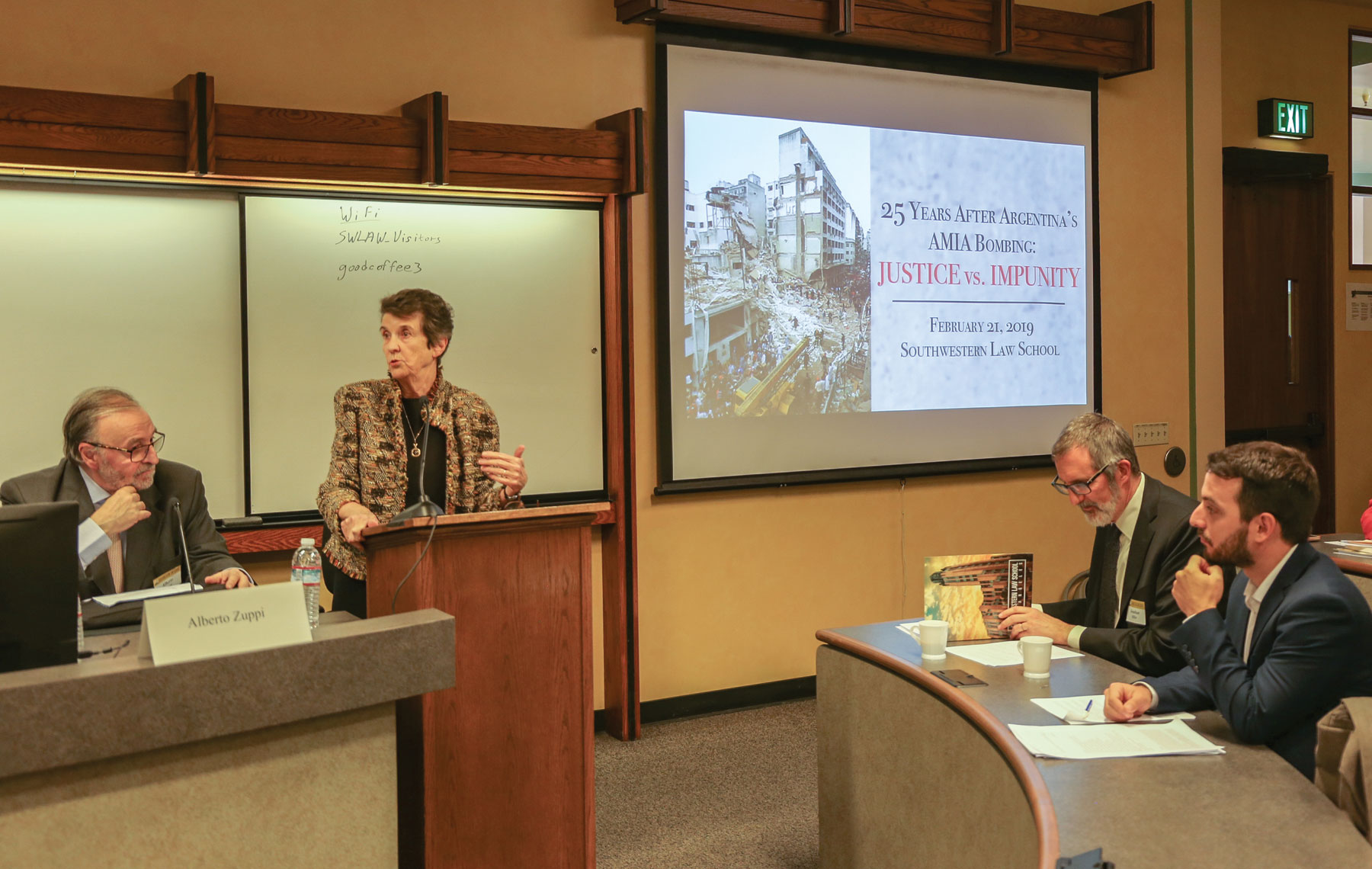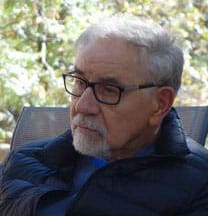 Susan Westerberg Prager, dean of Southwestern Law School, at the lectern, speaking at the “25 Years After Argentina’s AMIA Bombing” symposium. Photo courtesy of Southwestern Law School
Susan Westerberg Prager, dean of Southwestern Law School, at the lectern, speaking at the “25 Years After Argentina’s AMIA Bombing” symposium. Photo courtesy of Southwestern Law School At 9:53 a.m. on July 18, 1994, in Buenos Aires, Argentina, a suicide bomber in a Renault van detonated more than 600 pounds of explosives near the entrance to AMIA (Argentine Israelite Mutual Association in English), a five-story center that has, for generations, provided and sponsored a variety of crucial services for the largest Jewish community in Latin America.
The terrorist killed himself and 85 people who were in or near the Jewish center and injured hundreds. In the nearly 25 years since, there have been trials, accusations, public demonstrations, private lawsuits, volumes of testimony, videotaped bribery, at least one suspicious death and countless articles about Argentine malfeasance and the suspected involvement of Iranian, Hezbollah and Hamas officials. To date, no one has been convicted.
“Justice” and “impunity” were key words in a symposium about the incident, held on Feb. 21 at Southwestern Law School in Los Angeles. The event, “25 Years After Argentina’s AMIA Bombing: Justice vs. Impunity,” featured American and Argentine speakers, mostly attorneys, many of whom have been personally involved in unsuccessful attempts to fully learn the facts and hold the perpetrators and their allies responsible, whether in Iran, Lebanon, Syria or Argentina.
The first half of the symposium took place in a large classroom. Around 50 people attended. Each presentation was followed by critiques from experts and questions from the audience. One of the presenters was Gastón Chillier, an Argentine attorney and human rights activist, who spoke from Buenos Aires via Skype. He summed up the current state of the investigation, saying, “As of this day, Argentines do not know what happened.”
Speakers at the event, however, recounted what is, in fact, known about the convoluted history of the attack and its aftermath.
In 2001, 22 Argentines were tried for abetting the bombing, the so-called “local connection.” After a three-year trial, not one was found guilty of anything.
In 2005, the judge who had been in charge of the case, Juan Galeano, was accused of serious irregularities, including having been videotaped bribing a potential witness to give false testimony against some of the defendants. Galeano was impeached and removed from the judiciary.
In 2006, Argentine authorities accused Iranian government officials, including then-President Hashemi Rafsanjani, of masterminding the plot. Interpol issued arrest warrants for them in 2007, a move that was ignored by Iran and countermanded by a later Argentine government, which, in 2013, agreed to work with Iran to find the culprits. One symposium speaker said that Iran’s cooperation in this matter was like having Nazis in charge of the Nuremberg Trials.
“What matters to Argentine leaders is how things look, not how they really are. That’s why a cover-up is the instinctive way the country behaves when faced with a problem.”
— Rabbi Daniel Mehlman
In 2015, former Argentine President Carlos Menem went on trial for receiving bribes from Iran and for hindering the AMIA investigation. To date, no decision has been handed down. In 2017, former Argentine President Cristina Fernández de Kirchner was indicted for treason and obstruction of justice due to her alleged cover-up of Iran’s involvement in the bombing. Since she’s still a senator, she has immunity, though steps are being taken by legislators to strip her of it.
Speakers at the AMIA symposium disagreed on many points, but they all stressed the frustration of trying to get to the bottom of a matter in which Argentines in positions of public trust —police, judges, cabinet ministers and two presidents — have been accused of corruption and other crimes.
One of the bizarre twists of the case occurred in January 2015, when Alberto Nisman, a Jewish Argentine attorney who was investigating the AMIA case and was prepared to accuse then-President Fernández of having covered up Iran’s involvement in the bombing, was found dead from a gunshot wound. Fernández’s government declared it a suicide, which was disputed by those who were sure Nisman had been murdered to prevent him from testifying against Fernández.
At the symposium, Toby Dershowitz, an American whose background is in public relations, presented evidence of Iran’s culpability. “Alberto Nisman was my friend,” Dershowitz said. “He represents courage and the battle against corrupt forces.”
Most speakers pointed to Iran as the bad actor behind the attack, but Argentine civil rights lawyer Alberto Zuppi, who has represented families of AMIA bombing victims and published a book on the case last year, offered an alternative view. He said that when the attack took place, Israeli-Palestinian negotiations were at a delicate point. In its desire to salvage a possible Middle East accord, the Israeli government pushed the idea that only Iran was behind it, not Hamas or Hezbollah, and the established Jewish organizations in Argentina, including AMIA, went along with this.
Several speakers acknowledged that finding the truth behind Argentina’s worst terrorist attack is not a priority to most Argentines but that apathy about an old case hardly rises to the level of anti-Semitism.
During a break, over sushi and empanadas, several Argentine Jews who now live in Los Angeles discussed the case. Rabbi Daniel Mehlman said that Argentina has a long history of social and political amorality and a fragile grasp on human rights. He pointed out that Argentine leaders exploited indigenous people and Afro-Argentines in the 19th century, in effect, wiping them out, and they “disappeared” dissidents a century later, brutally killing 30,000 people in the 1970s.
“What matters to Argentine leaders is how things look, not how they really are,” Mehlman said. “That’s why a cover-up is the instinctive way the country behaves when faced with a problem.”
The final speaker of the night was Claudio Grossman, a Jewish Argentine and retired dean of American University’s law school. Grossman was an observer for the Inter-American Commission on Human Rights at the first AMIA trial, from 2001 to 2004, and subsequently issued a report sharply critical of the investigation and the trial.
Grossman’s tone was somber, chastening those who still hope for justice in the AMIA case. He said we should not expect countries to “do the right thing simply because it’s the moral thing to do. States take actions only out of self-interest, either political or economic, or both.”
Behind Grossman as he spoke was the event’s title, which read “Justice vs. Impunity,” as if it were not just a court case but also a martial arts death match for the soul of Argentina. Some of the symposium’s participants had offered a glimmer of hope that someday the truth will emerge, but Grossman’s analysis left little doubt that in the AMIA case, impunity has defeated justice.






















 More news and opinions than at a Shabbat dinner, right in your inbox.
More news and opinions than at a Shabbat dinner, right in your inbox.